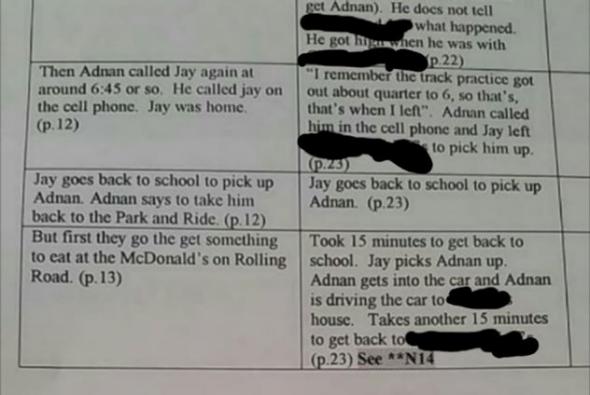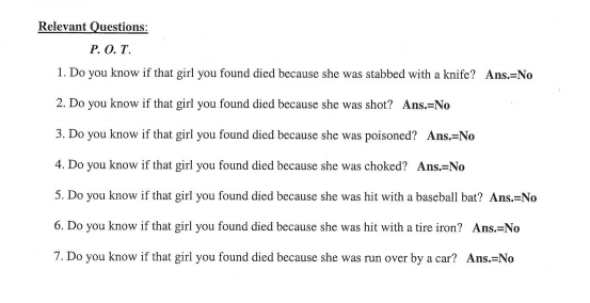If You Love Serial, You Should Be Reading This

Courtesy of Rabia Chaudry
Listen to Katy Waldman, David Haglund, and Julia Turner discuss Episode 5 of Serial.
When Serial, the captivating new podcast from the maestros of This American Life, gets hold of you, filling the time between episodes can become difficult. You sit and ruminate. You rehash each twist with friends, co-workers, or tolerant strangers. You spend way too much time on the subreddit devoted to the show. You start recording a podcast about another podcast. (Maybe that’s just me.)
As a supplement, I recommend Split the Moon, the personal blog of Rabia Chaudry. She’s the lawyer-gadfly-guardian angel who first brought Adnan Syed and his story to the attention of series creator Sarah Koenig.
If you have listened to the first five episodes of the podcast, which reinvestigates the 1999 murder of Baltimore County high school senior Hae Min Lee, you already know that Chaudry believes staunchly in Adnan’s innocence. Her first post about the show—she plans to recap the segments as they unspool, with a promise not to “spoil” anything, out of respect for the work Koenig and her colleagues are doing—is heartbreaking, not necessarily because it reveals a miscarriage of justice but because it charts the crime’s deep reverberations. “It has been a drawn out trauma for those of us who know and love Adnan,” Chaudry writes. She’s a frank, funny diarist whose default tone is vehemence. “I’ve run around with his case files for years, sometimes in the trunk of my car, sometimes storing them at my mothers, sometimes at Adnan’s parents. I held on to them through a bad marriage, divorce, single parenthood, remarriage, moving, and moving, and moving. I read them, forgot them, revisited them, forgot things again.”
It is the same obsessive circling of limited facts that defines our own experience as fans of Serial. The difference, of course, is that we can turn off our devices and retreat into lives that probably don’t involve the murder of a beloved high school student or the imprisonment of a friend for such a crime. For listeners attracted to Serial’s realness—how recognizable, relatable, and everyday the characters seem—the blog is one more unsettling reminder that our entertainment is the lived burden of Chaudry and many others. “I can rarely talk about [Adnan] or the case without crying,” Chaudry writes. “The pain of it has not dulled over 15 years and it remains precisely because I’ve felt like a failure.”
The blog hopes to rectify that failure. While she “badly wants [Koenig] and her team to say ‘hell yes Adnan is innocent,’ ” they’re “not there and I don’t know if they’ll ever be,” Chaudry admits. For us, though, the posts provide context, add analysis, and—openly and candidly—make the case that Adnan did not kill Hae. As someone whose sympathies so far are mixed, I strangely felt both more ignorant and more knowing than Chaudry as I read. She has access to information we don’t yet have, but she sees it all through an unshakably biased lens. “By … every account Adnan is a gentle, sweet natured guy,” she reports, whereas Jay “wouldn’t be considered credible … in any other reality.” Police reasonably posited that Jay’s shadiness was what made Adnan seek him out as an accomplice. But Chaudry dismisses that possibility with a quip: That Jay’s sketchy dealings “end up working in favor of Jay and against Adnan,” she says, is reminiscent of the Twilight Zone.

Courtesy Rabia Chaudry
Still, Chaudry makes some very astute points. Her gloss on Episode 2—in which Koenig and team assess Adnan’s supposed motive—hammers home what the TAL group only hints at. According to the state, competing claims made on Adnan by his religion and by Hae forced him to live a double life. When Hae ended the relationship, prosecutors surmised, Adnan was overcome with the fruitless deceit of what he’d done and killed her in retaliation. Koenig teases out a more nuanced story from members of Adnan’s friend group. But Chaudry, on her blog, is the one who squarely debunks this melodramatic account, and identifies the prejudice behind it. “The idea that Adnan is an inherently duplicitous and untrustworthy person because he was hiding his dating and girlfriend from his parents is laughable in the Muslim and Southasian context,” she writes. “This is how we do. It’s par for the course and you can bet all of us have our crazy ‘hiding your boo from your parents’ story.” The prosecution, Chaudry continues, was exploiting a set of “anti-Muslim and Islamophobic … fears.” Plus, if Adnan were so religious, she says, there’s no way he’d kill someone during Ramadan. (“Geezus when we’re fasting we don’t even cuss.”)
Aside from commentary, anyone who wants to get granular about documents, records, and timelines will find plenty to sift through here. Chaudry provides a wealth of chronologies, photographs, and other kibble for Serial bloodhounds. There’s a transcript of both polygraph tests administered to “S,” the streaker, with fine-tuned analysis of how the questions differed between exams one and two. There are close-up photos of the 60-page spreadsheet Chaudry created to track inconsistencies in Jay’s statements. (They are legion.) There are call records with important numbers highlighted or circled; typed testimony from witnesses; a Leakin Park trail map. It is all intricate and confusing enough to make you despair that any kind of truth can be massaged from the mess. But—and here is the promise of Serial and of Chaudry’s blog, too—somewhere in the tangle must lie the correct narrative, the key to the case. You can almost touch it. It’s right behind the next detail.
Chaudry’s blog isn’t the only place one can score a Serial fix between episodes. On Tuesday, Rabia’s younger brother Saad, one of Adnan’s best friends, participated in an Ask Me Anything thread on Reddit. He approached the case with the same assumptions as his sister—that Adnan “was a victim of shoddy police work, shoddy attorney work and discrimination.” Many of the insights he shared implicated Jay. Saad and Adnan “did both know that Hae was going to confront Jay about his infidelities with Stephanie so that may have been a motive,” he wrote. As for Stephanie, “I would actually love to hear her side of the story, she dropped Adnan like a bad habit when he got locked up.” At one point, Saad says that he doesn’t “really care if what I say spoils listeners experience, this is real life to me,” and Rabia chimes in. “No Saad, no spoilers! We should honor TAL’s work! That’s what I’m doing in my blog, so please also do the same. Otherwise I’m telling mom and dad on you.”

Courtesy Rabia Chaudry
The blog and the subreddits can’t match the podcast’s eerie power to enthrall—they aren’t carefully shaped narratives, and they don’t provide the intimacy of someone’s voice in your ear. But they deliver more of the everyday minutiae that Serial insists is part even of murder cases. (Curious about the lower depths of the rabbit hole? Read this bewildering subreddit in which a “childhood contact” of the Syeds comes forward to assert that Adnan is a psychopath.) Most crucially, they perform a service that Koenig dodges again and again: They tell you what to think.
This gesture—the Chaudrys will scratch your certainty itch—is satisfying in a way Rabia and Saad may not have anticipated. My Serial trajectory so far: First, I was convinced Jay did it. Then I realized I just ardently wanted to be convinced that Jay did it. Now I know I just ardently want to be convinced of something. I’m hungry for conviction, in both senses, but I’m no picky eater: Jay, the drug-dealing “criminal element of Woodlawn,” is a beguiling suspect, but I’d be equally satisfied if all arrows pointed to Adnan. It is odd and not altogether pleasant to notice this fact while reading Chaudry’s activist blog, Saad’s earnest AMA. What becomes crystal clear is the difference between being a voyeur and being involved. No matter how the arc of Serial turns, we listeners “win.” Back in real life, though, most everyone’s already lost.
